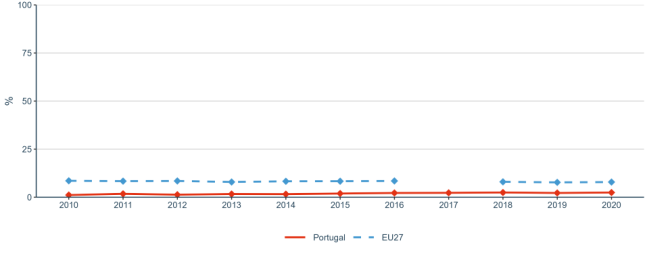ERA Country Report 2023
Portugal
Edited by Carmen Hoya (Ecorys)
as part of ‘Development of the ERA Scoreboard, the ERA Dashboard and the Regular Reports’ project for the European Commission, Directorate-General for Research and Innovation under Framework Contract N° 2018/RTD/A2/OP/PP-07001-2018 Lot 2 (EDAR)
Click here to download this country report![]()
- Table of contents
-
ERA Country Report 2023: Portugal
1. National context
1.1. Overview of the ERA policy agenda implementation
1.2. Policy context
2. Assessment of the Implementation of the ERA Policy Agenda and ERA Priorities
2.1. ERA Priority 1: Deepening a truly functional internal market for knowledge
2.2. ERA Priority 2: Taking up together the challenges posed by the twin green and digital transition and increasing society’s participation in the ERA
2.3. ERA Priority 3: Amplifying access to research and innovation excellence across the Union
2.4. ERA Priority 4: Advancing concerted research and innovation investments and reforms
3. Country-specific drivers and barriers
4. Final remarks
5. Bibliography
6. Annexes
6.1. Annex 1: Graphs
ERA Country Report 2023: Portugal
|
Key takeaways:
|
1. National context
1.1. Overview of the ERA policy agenda implementation
According to the European Innovation Scoreboard (EIS), Portugal is considered a Moderate Innovator. Although positive progress has been observed in this regard, the level of innovation is still below the European average. ^ Nonetheless, the country has shown great alignment with the ERA Policy Agenda.
In this regard, Portugal’s approach towards the promotion of the R&I system entails a wide range of policies. Since COVID-19, the Recovery and Resilience Plan (RPP) has been an important instrument for the enhancement of R&I, and the overall strategy for the country until 2030 is the National Strategy for Smart Specialization interlinked with the regional sphere3. In addition, the Technological and Business Innovation Strategy 2018-2030 designed by the National Innovation Agency (ANI) acted as the focal point of an inter-ministerial group. It focuses on business technological innovation for increasing the private investment in R&I, developed through eight strategic factors: monitorisation, strengthening of the Interface centres, technological development, boosting investment in research and development, promoting entrepreneurship, improving the allocation of European funds, promoting innovation, and foster internationalisation. These strategies are primarily related to ERA Priority 1: “Deepening a truly functional internal market for knowledge” and ERA Priority 2: “Taking up together the challenges posed by the twin green and digital transition and increasing society’s participation in the ERA”.
The National Smart Specialisation Strategy (NSSS) 2030 provides a new vision to adapt the Portuguese economic system to the major challenges at the European level through a redefinition of priorities. Similarly, the Portuguese Innovation and Digital Transition Program (Compete 2030) leads, through an agreement with the European Commission, the application of cohesion policy funds 2021-2027 in the areas related to digitalisation, qualification and innovation while enhancing a more sustainable and social Portugal. Public policy in Portugal is extremely linked with the Cohesion Funds (CF), and therefore, the European Union Partnership Agreement has been key for the development of the R&I system of the country in past years.
1.2. Policy context
The Portuguese R&I system is based on the principle of open collaboration, with the aim of maximising resources on science and technology. In this sense, it follows an interministerial approach addressing all stakeholders, joining R&I with climate, environment, social security, labour, health, European Affairs, and maritime affairs.
The central organisation at a national level is the Ministry for Science, Technology, and Higher Education (MCTES). Its mission is to formulate, conduct, execute and evaluate the national policy for science, technology and higher education. In addition, the Minister of Economy and the Sea focuses on policies aimed at economic growth, competitiveness, investment and innovation, the internationalisation of companies, the promotion of industry, commerce, services and tourism, consumer protection and transversal coordination of maritime issues.
In 2019, MCTES created the PERIN Network to promote the global participation of Portugal´s R&I, encouraging partnerships at the international and European levels, such as Horizon Europe. PERIN involves different agencies to address specific challenges, with the prevalent roles of the Foundation for Science and Technology (FCT) and the National Innovation Agency (ANI). FCT is the main national public agency that funds research in science, technology, and innovation in all areas of knowledge. FCT has also established a Global Science and Technology Partnership (GoPortugal) based on international cooperation that has supported a series of partnerships with institutions around the world. ANI is a government-funded agency whose mission is to “catalyse and boost innovation in Portugal”. ANI promotes cooperation to improve the link between science and economy, boosting energy and digital transition and territorial cohesion. As mentioned, PERIN also involves other agencies focused on specific areas of R&I, such as the Agência Espacial Portuguesa (Portugal Space), the Agência de Investigação Clínica e Inovação Biomédica (AICIB), Agência Nacional Erasmus+ Educação e Formação, and the Direção-Geral do Ensino Superior (DGES).
Finally, the Innovation, Technology and Circular Economy Fund (FITEC) allocates funds under the administration of the MCTES and supports the “National Digital Skills Initiative e.2030, Portugal IN.CoDe.2030” launched in 2017 to support the implementation of digital skills.
2. Assessment of the Implementation of the ERA Policy Agenda and ERA Priorities
Chapter 2 has two objectives: 1) It qualitatively assesses the state-of-play of the implementation of the ERA actions that Portugal has committed to; 2) It quantitatively assesses the country’s progress towards achieving the ERA priorities as set out on the Pact for Research and Innovation in Europe. The qualitative information is mainly obtained from national reports, different European-level studies, and the OECD STIP survey. The presented quantitative information is mainly based on the ERA Scoreboard and ERA Dashboard indicators and covers longer-term trends since 2010. Additionally, general indicators for the overall R&I system are outlined in Table 1. More detailed information on the data and graphs can be found in Annex 1. This report serves as a baseline for reporting in the future.
|
Indicator |
Most recent EU average |
Most Recent Metric |
|
Gross Domestic Expenditure on R&D (GERD) as a percentage of GDP |
2.26 (2021) |
1.66 (2021) |
|
Government Budget Allocations for R&D (GBARD) as a share of GDP |
0.76 (2021) |
0.36 (2021) |
|
Researchers (in full-time equivalent) per million inhabitants |
4,483.4 (2021) |
5,473.3 (2021) |
|
Business Enterprise expenditure on R&D (BERD) as a percentage of GDP |
1.49 (2021) |
1.0 (2021) |
Source: compiled by research team based on the ERA Scoreboard and ERA Dashboard indicators
2.1. ERA Priority 1: Deepening a truly functional internal market for knowledge
2.1.1. State of play in the implementation of the ERA Actions
In relation to ERA Action 1: Enable the open sharing of knowledge and the re-use of research outputs, including through the development of the European Open Science Cloud (EOSC), the National Foundation for Science and Technology (FCT) has been involved in the EOSC initiative since its beginning. The Council of Ministers Resolution no. 21/2016 settled the implementation of the National Open Science Policy. This policy highlights the importance of ensuring free and open access while encouraging engagement with the Open Science community. Portugal is also known for the Open Access Scientific Repositories of Portugal (RCAAP), an innovative plan involving university libraries at a national level that have recently been digitalised. Furthermore, FCT has been running its national publishing infrastructure PubIn in alignment with the Council conclusions on high-quality, transparent, open, trustworthy and equitable scholarly publishing. All these are developed in accordance with the Law on General Open Data Principles 68/2021 that settles the general principles in this regard.
Portugal has made positive progress on ERA Action 2: Propose an EU copyright and data legislative framework for research. In this sense, the National Research and Innovation Strategy for Smart Specialisation (ENEI 2022) is key for the advocacy of innovation. It is focused on six priorities, among which production systems and technologies, can be found. It aims for long term structural changes and involves companies, research institutions, associations, and experts, in a consultation process. In addition, the FCT adopted an Open Access Policy in 2014 to promote the publishment of scientific papers in the RCAAP´s repositories for Open Access. This encouraged FCT to join the “COAlition S” in 2021 to promote the implementation of Plan S (an initiative for open access publishing). In this sense, FCT is currently working in this regard through three main areas: supporting Gold and Diamond Open Access publication, encouraging the deposit of the author accepted manuscripts in open repositories, and negotiating Transformative Agreements.
Contributions to both ERA Actions 1 and 2 are reflected in both the EOSC Catalogue of Best Practices and 2021 Survey. Among the EOSC best practices, the Data Management MOOC of the University of Minho in collaboration with the Ministry of Science, Technology and Higher Education aims to improve support to research data management. The EOSC 2021 survey also highlights Portuguese efforts on the preservation and reuse of scientific information and open access to software.
As regards ERA Action 3: Reform the Assessment System for research, researchers and institutions, there has been an expansion of research centers and the Council of Ministers has established the Public Investment Program in R&D to modernise research and development infrastructures. As a consequence, nine new collaborative laboratories were recognised in 2021 and six in 2022. FCT has been piloting the Narrative CV format, with the aim of promoting a comprehensive and accurate evaluation of the careers of Portuguese researchers. This new criterion has been specified in several calls such as the RESTART Programme and FCT-Tenure. Furthermore, 17 Portuguese entities have joined CoARA and the preparation of the National Chapter is ongoing.
While, according to the European Semester Report 2023, Portugal is one of the countries with an advanced public research system, the country has perceived challenges related to precarity and working conditions that often lead to “brain drain”. Hence, with relation to ERA Action 4: Promote attractive research careers, talent circulation and mobility, Portugal is developing a set of policy measures to reduce precarity in the country, including programmes with the aim of promoting a more stable contractual relationship to foster more stable employment. For instance, the Scientific Employment Stimulus works as an enhancing programme for researchers’ employment while comprising additional instruments as the Transitory Norm of DL 57/2016. Portugal is the “co-sponsor” of ERA action 4 and is actively involving the stakeholders for a swift and smooth adoption of the recently approved European Framework to attract and retain research and innovation and entrepreneurial talent in Europe. FCT also carries out Dialogos@Ciencia, a set of dialogues that aim to discuss on research and innovation both at a national and global level, mainly conformed by stakeholders on the topic.
Portugal has also committed to ERA Action 5: Promote gender equality and foster inclusiveness. A more gender inclusive culture has been propelled in the R&I ecosystem by the generalised development and implementation of GEPs (Gender Equality Plans) in RPOs and RFOs, triggered by the eligibility criterion for European funding. Similarly, RESTART Programme supports researchers to coordinate the professional and family life in accordance with the OECD principle of a good conciliation. Additional measures are also foreseen to be established soon under the revamped National Strategy for Equality and Non-Discrimination 2018-2030 (ENIND 2023), namely as regards the parity targets in management and governance bodies, and across career stages. In an earlier period, FCT carried out the Gender Research 4 COVID 19 to promote the publication and recognition about the impacts of the pandemic in gender areas and to propose solutions for the consequences.
Portugal has committed to ERA Action 6: Protect academic freedom in Europe. Currently, the Basic Law of the Portuguese Education System does not address the area of academic freedom as a concept itself. Although briefly mentioned in specific areas, there is no public debate on the importance that academic freedom has in Portugal, and therefore no initiatives referring to this specific action can be reported.
Connected to ERA Action 7: Upgrade EU guidance for a better knowledge valorisation, through the Technological and Business Innovation Strategy 2018-2030, ANI has highlighted the Born from Knowledge (BfK) programme as the instrument to increase recognition of Portuguese talent as an entrepreneurship source through a system of incentives and awards. Regarding Training and Awareness-raising, ANI promotes a series of intensive training actions through the Best Practices Manual for the intelligent use of IP, with the aim of guiding the technology transfer process. In addition, Sciencepreneur and Impact@Nova are some of the main national initiatives for knowledge valorisation. Following these, the Portuguese Agency for Competitiveness and Innovation (IAPMEI) created a certification programme called Tech Visa to ensure the access to adequate jobs for the academic researchers.
On ERA Action 8: Strengthen sustainability, accessibility and resilience of research infrastructures in the ERA FCT developed the Polen project to promote Open Science and increase effectiveness on the management of data. Furthermore, GBIF Portugal was established in 2013 to enhance integration of information sources and biodiversity assets data on the GBIF network. Moreover, this action and the different topics involved, are also covered by ESFRI and the Working groups on areas such as environment, digital research, and social innovation among others, among which Portugal has increased the involvement of national experts.
The RPP includes a programme developed by ANI known as Interface Mission whose main objective is to consolidate and widen a network of technological intermediation institutions and foster its articulation with private companies. This is closely related to ERA Action 9: Promote a positive environment and level playing field for international cooperation based on reciprocity as it promotes investment and innovation while fostering cooperation, mobility, and internationalisation. The Global Science and Technology Partnership (GoPortugal) based on international cooperation, has supported a series of partnerships with institutions around the world (Massachusetts Institute of Technology or the Portuguese Association of Researchers and Students in the UK) to encourage collaboration at a global level. Similarly, the Centro Ciência LP intends to guarantee effective cooperation procedures among Portuguese Speaking Countries scientific and academic institutions to counter “brain drain” in Africa.
2.1.2. Progress towards achieving ERA Priorities
With regard to progress towards Sub-priority 1.1: Open science, the indicator share of publications available in open access in Portugal has remained higher than the EU average in the last years (Figure 5 in Annex 1). In 2009, the percentage corresponding to Portuguese publications was 39.10% against the 22.94% result of the EU. However, the distance between the values in 2019 has suffered a considerable reduction as Portugal has remained around the same percentage while the European value has increased to 39.54%. However, this percentage is expected to raise as transformative agreements have entered into force from August 2023 onwards.
Looking at Sub-priority 1.2: Research Infrastructure, the share of national public R&D expenditure allocated to European research infrastructures is similar in 2022 in Portugal (with 1.52%) and the European average (1.82%). Moreover, the number of European research infrastructures in which a Member State or an Associated Country participated in 2021 is slightly higher in Portugal, with a value of 20, compared to the European average of 15.46 (Figure 6 in Annex 1).
The indicators analysed towards Sub-priority 1.3: Gender equality, equal opportunities for all and inclusiveness show overall good performance in comparison to the EU average. The share of women in grade A positions in HEIs (2010-2018) (Figure 7 Annex 1) is growing in both Europe and Portugal, although in Portugal such improvement has fluctuated along the years. Alternatively, the proportion of women among doctoral graduates by narrow fields of STEM (2010-2020) is higher in Portugal than in the rest of the EU even though it has been decreasing since 2010 (Figure 8 in Annex 1). On the other hand, the EU average has stagnated since 2013.
Regarding authorship, the proportion of papers with mixed authorship from 2000 to 2020 (Figure 9 in Annex 1) is increasing following similar trends in Portugal and Europe. Figure 10 in Annex 1 shows that there has also been a general increase on the proportion of women authorship of the 10% most cited publications between 2000 and 2018, although the Portuguese percentages remain slightly higher in both areas. Likewise, the value for Women in Digital Index in 2022 (Figure 11 in Annex 1) is higher in Portugal than in the EU mean, corresponding to 57 and 54.9 respectively.
The progress towards Sub-priority 1.4: Careers and mobility of researchers and research assessment and reward system entails three main indicators. The share of foreign doctorate students as percentage of all doctorate students (Figure 12 in Annex 1) has been increasing during the last years in Portugal and at EU level, and the gap between them has remained the same between 2015 and 2020. Nonetheless, the number of new graduates per 1,000 inhabitants aged 25-34 (2015-2021) has slightly decrease in both regions. Portugal showed a value of 0.7 in 2021 and remained under the EU average (Figure 13 in Annex 1). Regarding the level of job-to-job mobility of Human Resources in science and technology, Figure 14 in Annex 1 shows a common positive trend from 2010 to 2020. Even though they share a common peak in 2019 representing a value of 9.1 in Portugal and 7.6 at the European level, both go down in 2020, probably due to the pandemic situation.
In terms of Sub-priority 1.5: Knowledge valorisation, the Portuguese share of public-private co-publications per 1 mio. population (Figure 15 in Annex 1) has improved consistently from 2011 to 2021, overcoming the EU average that had a slower growth. However, in relation to the number of PCT patent applications divided by GDP in million Euros (Figure 16 in Annex 1), the EU average has remained above the Portuguese value, although suffering a slight decrease from 2010 to 2015. Portugal has been increasing until reaching a 0.0012 value. Moreover, Portugal and Europe have had a similar growth between 2010 and 2020 in business enterprise researchers as % of the national researchers (Figure 17 in Annex 1), and business enterprise researchers in full-time equivalent per thousand employees in industry (Figure 18 in Annex 1). The same happened with the share of innovating firms collaborating with HEIs, or public/private research institutions (2010-2020) (Figure 19 in Annex 1). Still, Portugal is below Europe in all three mentioned fields.
For Sub-priority 1.6: Scientific Leadership, two indicators have been analysed. Regarding number of scientific publications among the top-10% most cited publications worldwide as a percentage of all publications (Figure 20 in Annex 1), both trends are similar along time, remaining around a value of 10. However, the Portuguese value drops a little in 2020. On the other hand, Portugal performs slightly better than EU-27 in relation to the Academic Freedom Index (AFi) as can be observed in Figure 21 in Annex 1. Both remain constant until 2021 when they suffer a small drop.
Sub-priority 1.7: Global engagement has been an important area for the country, and consequently there has been a noticeable improvement in the Portuguese international co-publications with non-EU partners per 1,000 researchers (in full-time equivalent) in the public sector (Figure 22 in Annex 1) between 2010 and 2021, reaching a peak in 2021 of 1,701.84 co-publications. The European results have also improved, but their data remains under the Portuguese. On the contrary, the European and international co-patenting in EPO applications from 2010 to 2013 exemplifies the stagnation of the EU average that remains highly above Portugal, despite its growing trend demonstrated in Figure 23 in Annex 1.
2.2. ERA Priority 2: Taking up together the challenges posed by the twin green and digital transition and increasing society’s participation in the ERA
2.2.1. State of play in the implementation of the ERA Actions
ERA Action 10: Make EU R&I missions and partnerships key contributors to the ERA. Portugal participates in 21 Horizon Europe Partnerships out of the 22 (95%) that are relevant for countries’ participation, with a focus on the following broad strategic areas. In specific Co-funded Partnerships, Portugal uses ERDF as national contributions for project beneficiaries based in the regions of application of the ERDF Operational Programmes. Regional and managing authorities, which are also beneficiaries of the partnerships, provide funding for calls in Co-funded Partnerships to support the national contribution.
The previously mentioned National Research and Innovation Strategy for Smart Specialisation (ENEI 2022) appeals also to ERA Action 11: An ERA for green energy transformation. Among its aforementioned priorities, green transition and great natural assets are also included. In addition, the Action Plan of the National Strategy for the Sea 2021-2030 presents 185 measures to increase scientific knowledge, protect the Ocean and promote a sustainable economic use. The Road Map for Carbon Neutrality 2050 sets out the vision and greenhouse gas trajectories towards reaching carbon neutrality by 2050 and identifies guidelines for the policies and measures needed to achieve this goal. Portugal also has a programme to Mobilising Agendas for Business Innovation RRP - C5 (Green Alliances), to consolidate business innovation and its effects.
Portugal is highly committed to climate change, digital transition, and the resilience of the R&I system in these regards. For this reason, the country has been improving its engagement in ERA Action 12: Accelerate the green/digital transition of Europe´s key industrial ecosystems and the SDGs. This action is addressed through a legal framework of cooperation with HEIs, and through the development of GoPortugal to promote mobility and increase qualification and technological skills. In addition, ANI covers the sector standardisation for innovation, ensuring the adequate and efficient use of science and technology and establishing an information framework within the adequate legal regulations. The Technical Commission 169 (CT 169) is, then, in charge of analysing the standards at an international level and assessing the coherence of the regulation. Moreover, a new National Strategy for Green Public Procurement 2030 – ECO360 has been launched this year, to intensify the Green Public Procurement (GPP) and its role in the public and private sectors to improve efficiency and work towards climate neutrality.
Portugal has been improving its performance in a variety of education and academic indicators. However, challenges remain in relation to the size of low skill adult population. In order to work on ERA Action 13: Empower Higher Education Institutions to develop in line with the ERA, and in synergy with the European Education Area the Portuguese HEIs engage in the European Universities Initiative. It is a flagship strategy that aims to expand universities alliance within the Union that promotes academic transferability and cooperation within the educational systems.
Portugal is recognising the importance of citizens´ trust and engagement in science, closely related to ERA Action 14: Bring Science closer to Citizens. A partnership led by the Gulbenkian Institute of Science (IGC) has promoted a communication initiative to increase dialogue between society and research agencies: Ciência + Cidadã. Likewise, Ciencia Viva is an independent agency born in 1996 to promote cultural science in the Portuguese society that works to increase public awareness about science and technology. Under this agency, the Healthy Neighbourhoods Programme funds projects in different areas that encourage cooperation between local organisations and research sources. All this is related to strategy nº7 in the Technological and Business Innovation Strategy 2018-2030 of creating an Innovation Platform to advertise national successes and raise interest on social activities.
2.2.2. Progress towards achieving ERA Priorities
One of the main areas to analyse when looking at Sub-priority 2.1: Challenge-based ERA actions, is the Government budget allocations for R&D (GBARD) by NABS in energy; environment; transport, and telecommunications and other infrastructure (Figure 24 in Annex 1). The cost of energy and transport has been gradually increasing in both Portugal and Europe, with the Portuguese values remaining below the EU-27 average. In terms of environmental budget, Portugal has seen some fluctuations until 2015, but since then the value has remained around 33. Moreover, the GBARD allocated to Europe-wide transnational, as well as bilateral or multilateral, public R&D programmes per FTE researcher between 2010 and 2020 (Figure 25 in Annex 1) followed the same trend in Portugal and Europe. The performance was quite stagnated and hence, did not suffer big changes. The values for Portugal went from 364.3 in 2010 to 283.2 in 2020, and the European average budget from 1,935.82 in 2010 and 1,788.8 in 2020.
When looking at the environmentally related government R&D budget the percentage as of total government R&D is higher in Portugal that in the EU (Figure 26 in Annex 1). On the contrary, national public and private investments as suggested in the SET Plan progress report 2021 (2010-2020) (Figure 27 in Annex 1) values for EU-27 are considerably higher than the Portuguese, and both regions follow the same trend. The OECD patents on environment technologies (Figure 28 in Annex 1) demonstrate a stagnation for the European results between 2010 and 2018, while Portugal presents a decreasing trend.
In relation to education, Sub-priority 2.2: Synergies with education and the European Skills Agenda the share of researchers receiving transferable skills training (Figure 29 in Annex 1) has increased in Portugal, in accordance with the current skills programs that are being developed, while EU average has decreased. In 2016, the Portuguese value was of 40.2% and hence, it was below the Europe percentage corresponding to 49.5%. However, in 2019 Portugal increased to 44.5% and the EU average was around 46.3%, leading to a gap reduction.
Providing evidence about the Portuguese performance towards Sub-priority 2.3: Synergies with sectorial policies and industrial policy, in order to boost innovation ecosystems, the direct government support and indirect government support through R&D tax incentives as a percentage of GDP (Figure 30 in Annex 1) evolved simultaneously and increased from 2010 to 2020 for Europe and Portugal, having the last a peak in 2020 with 0.29%.
Lastly, Sub-priority 2.4: An active citizen and societal engagement in R&I in all its dimensions is represented in Figure 31 in Annex 1 through trust in science in 2021. As represented, Portugal counts with a percentage of 59.3% while the EU average is around 43.2%. In addition, as Figure 32 in Annex 1 shows, the Portuguese evolution on research of social innovation per million population is also above the European one. Still, it is true that the gap varies along the years, mainly due to the fluctuation trend of Portugal.
2.3. ERA Priority 3: Amplifying access to research and innovation excellence across the Union
2.3.1. State of play in the implementation of the ERA Actions
Related to ERA Action 16: Improve EU-wide Access to excellence, ANI carries out the individual demonstration projects with the EC Seal of Excellence. The call under this initiative aims to promote funding for activities within the private sector. Similar initiatives developed by the FCT are the National Calls on Scientific Employment, on PhD Grants, supporting R&I units and projects, or the Calls under the Driving Urban Transitions. Furthermore, the government launched in 2018 Startup+ Portugal, a joint partnership with programmes to support new ideas fighting emerging challenges in the initial business stages. In addition, Centro Ciencia LP was developed, focusing on the association between the scientific and economic organisations within the Portuguese-speaking countries. It aims to mobilise institutions with the aim of stimulate research and development.
Portugal offers policies following the ideas introduced in ERA Action 17: Enhance the strategic capacity of Europe´s public research performing organisations such as the Scientific and Technological Cooperation Agreements between FCT and Fundacao “La Caixa”. Created in 2018, is a key example of existing initiatives to support innovation, research, and investigation activities on the Iberian region in the long-term.
2.3.2. Progress towards achieving ERA Priorities
In relation to Sub-priority 3.1: More investments and reforms in countries and regions with lower R&I performance, the average increase of total R&D expenditure as a percentage of GDP (Figure 33 in Annex 1), grew in the period of 2011-2021 in Portugal from -0.08pp to 0.07pp, having a peak in 2020 when it got a value of 0.22pp. Instead, for the EU average it worsened, having a mainly decreasing trend in which the figures went from 0.05pp to -0.04pp.
2.4. ERA Priority 4: Advancing concerted research and innovation investments and reforms
2.4.1. State of play in the implementation of the ERA Actions
Looking at ERA Action 19: Establish an efficient and effective ERA monitoring mechanism it is important to mention ANI´s monitoring instrument. It creates rankings based on key innovation indicators and includes an Innovation Portal that display R&I and development results as well as the Smart Monitor, a digital tool for monitoring transfer dynamics. ANI also develops thematic reports as the National Innovation Report, characterised for evaluating the country´s policy trends.
2.4.2. Progress towards achieving ERA Priorities
The evolution of share of public R&D expenditures financed by the private sector from 2010 to 2020 (Figure 34 in Annex 1) increased simultaneously in both Portugal and the EU, maintaining the gap along the whole period. Portugal´s performance corresponds to a 1.12% in 2010, and 2.41% in 20202, remaining below the European results that went from 8.54% to 7.87% in the same period. Here, the improvement in Portugal towards Sub-priority 4.1: Coordination of R&I investments can be observed.
3. Country-specific drivers and barriers
The analysis shows Portugal’s evolution in relation to the different priority areas of the ERA. Among the drivers of the Portuguese R&I system contributing to the implementation of the ERA Policy Agenda are the investments dedicated to the R&D in the Recovery and Resilience Plan (RRP). The RRP includes funding dedicated to supporting environmental research and fostering scientific collaborations between public and private sectors. The “Collaborative Laboratories” (COLAB) were highlighted in the European Semester 2023 report as a promising initiative to support collaboration between higher education institutions, enterprises, technological centres, companies, business associations and others. The country also has a strong public research system, generating large numbers of graduates and attracting foreign doctoral students. However, some challenges remain related to developing attractive working conditions and retaining talent within the country.
As mentioned above, the support for environmental research is prioritised in Portugal, contributing towards the implementation of initiatives under the ERA Priority 2. Portugal has already implemented programmes such as the National Energy and Climate Plan 2030 (PNEC2030), which focuses on the reduction of greenhouse gases and the increase of renewable energy, and the Roadmap for Carbon Neutrality 2050 (RNC2050) that evaluates strategies to reach carbon neutrality by 2050. This contributes towards the gradual shift to a sustainable economic system in Portugal. The economic activity and research on renewable energy have become one of the priorities in the country, facilitating the implementation of the ERA Priority 2 actions.
The Portuguese economy has a high proportion of micro, small and medium companies, representing 99.7% of the total number of companies in 2019. These types of companies present certain disadvantages compared to large companies, including having fewer financial resources that can limit their involvement in R&I. The same can happen with internationalisation and open science; the small size of the majority of Portuguese companies implies a reduced presence at an international level. In this sense, the European Semester Report 2022 enhances the importance of increasing the recognition of these companies and explains how the RRP aims to improve the financing conditions for them. However, there is a lack of funding from public and private entities. Therefore, the European Semester Report 2023 discusses that, although the country sets ambitious targets to promote R&I and enhance the Portuguese research environment, insufficient investment slows down the development of the Portuguese research environment.
Still, the initiatives that Portugal has recently developed aim to address the challenges that affect the implementation of the ERA Policy Agenda. In this sense, the evidence demonstrates that the government expenditure on business research and development is starting to increase, and in recent years, job creation programmes have focused on enhancing productivity at the macro level to face the issues related to Portuguese companies.
4. Final remarks
Portugal has demonstrated its commitment towards the ERA Policy Agenda through engaging in all actions and has paid special attention to ERA Priorities 1 and 2. Although no specific national plan is devoted to the ERA, the Technological and Business Innovation Strategy 2018-2030 presents eight strategic factors that correlate to the ERA actions. Similarly, the Smart Specialisation Strategy prepared under the Cohesion Funds and the Mobilising Agendas from RRP are also conditional for developing the Portuguese R&I environment.
Portugal has demonstrated overall substantial engagement in most ERA actions. There has been a notable improvement in academic-related gender equality areas, open science, knowledge transferability, research careers, and citizens’ and international engagement. In addition, government support for research and innovation has also developed in recent years.
Nonetheless, there are other aspects in which improvements should be sought. It includes the ERA Priorities 3 and 4, where additional policies related to the Portuguese levels of R&D expenditure and the share of public R&D expenditures could improve the performance.
5. Bibliography
`About PERIN´ PERIN, available at https://perin.pt/about/
`About RCAAP´ RCAAP, available at https://www.rcaap.pt/about.jsp
`About Startup Portugal´ StartUp Portugal, available at https://startupportugal.com/about/
`Action lines´ INCoDe2030, available at https://www.incode2030.gov.pt/en/
Action Plan of the National Strategy for the Sea 2021-2030 (Plano de Ação da Estratégia Nacional para o Mar 2021-2030), Official Gazzette 01 September 2021
`Born From Knowledge´ ANI, available at https://www.ani.pt/en/knowledge-valorization/interface/born-from-knowledge-bfk/
`Ciencia Viva´ Ciencia Viva, available at https://www.cienciaviva.pt/sobre/a-ciencia-viva
`CienciaLP Background and mission´ Ciencia LP, available at https://www.ciencialp.pt/en/centro-ciencia-lp-english/#background
`Citizen Science´ Gulbekian Institute, available at https://gulbenkian.pt/ciencia/science-society/citizen-science/
DL 57/2016 Scientific Employment Transitory rule (Norma Transitória do DL 57/2016), FCT on the 31 August 2018
`Economy´ Government of Portugal, available at https://www.portugal.gov.pt/en/gc21/ministries/economy/minister
`ENEI – National Strategy for Smart Specialisation (ENEI Estratégia Nacional de Especializacao Inteligente) ANI, available at https://www.ani.pt/en/knowledge-valorization/valuation-policy/enei-national-strategy-for-smart-specialisation/
European Commission (2021) `European Research Area Policy Agenda´ European Commission, available at https://research-and-innovation.ec.europa.eu/system/files/2021-11/ec_rtd_era-policy-agenda-2021.pdf
European Commission (2023) `Portugal 2023 Country Report´ European Commission, available at https://economy-finance.ec.europa.eu/system/files/2023-05/PT_SWD_2023_622_en.pdf
European Parliament (2021) `Challenges and concerns for small and medium-sized enterprises (SMEs) doing business in third countries´, available at https://www.europarl.europa.eu/RegData/etudes/BRIE/2021/653629/EXPO_BRI(2021)653629_EN.pdf
`European Research Area (ERA)´ European Commission, available at https://research-and-innovation.ec.europa.eu/strategy/strategy-2020-2024/our-digital-future/european-research-area_en
`FCT – AGA-KHAN Development Network´ OECD, available at https://stip.oecd.org/stip/interactive-dashboards/policy-initiatives/2023%2Fdata%2FpolicyInitiatives%2F99997470
`FITEC – Interface Programme´ ANI, available at https://www.ani.pt/en/knowledge-valorization/interface/fitec-interface-programme/
`Fundacao para a Ciencia e a Tecnologia´ FCT, available at https://www.fct.pt/
Funding programmes and initiatives for entrepreneurs´ EPortugal, available at https://eportugal.gov.pt/en/cidadaos-europeus-viajar-viver-e-fazer-negocios-em-portugal/apoios-para-empresas-em-portugal/programas-financeiros-e-iniciativas-para-empresarios
Gareth O'Neill, & Stefania Martziou. (2022). Data of Survey on National Contributions to EOSC 2021. Available at: https://doi.org/10.5281/zenodo.7431678
`GBIF Portugal´ GBIF, available at https://www.gbif.org/publisher/e061767c-6138-4700-af1e-53ad31fe69db
`GoPortugal – Global Science and Technology Partnership Portugal´ FCT, available at https://former.fct.pt/apoios/cooptrans/goportugal.phtml.en
`GoPortugal´ OECD, available at https://stip.oecd.org/stip/interactive-dashboards/policy-initiatives/2023%2Fdata%2FpolicyInitiatives%2F99997468
`Home´ ANI, available at https://www.ani.pt/en/
`Home´ WomenInTech, available at https://www.womenintech.pt/
`Homepage´ Eu Sou Digital, available at https://www.eusoudigital.pt/
`Iberian Initiatives on research and innovation´ FCT, available at https://former.fct.pt/apoios/cooptrans/fundacaolacaixa/index.phtml.en
ILO (2020) `Attaining SDG 8 in Portugal: Macroeconomic, Sectoral, and Labour Market Policies for Structural Transformation and Full and Productive Employment´, available at https://www.ilo.org/wcmsp5/groups/public/---ed_emp/documents/publication/wcms_751540.pdf
`Incentive System for Technological R&D in companies (SI I&DT) – CO-Promotion Projects´ OECD, available at https://stip.oecd.org/stip/interactive-dashboards/policy-initiatives/2023%2Fdata%2FpolicyInitiatives%2F3926
`INCoDe 2030 Legislation and Documents´ INCoDe2030, available at https://www.incode2030.gov.pt/en/documentos-en/
`Initiative Knowledge for Development – IKfD´ Ciencia LP, available at https://www.ciencialp.pt/en/ikfd-eng/
`Innovation Scoreboard´ European Commission, available at https://research-and-innovation.ec.europa.eu/statistics/performance-indicators/european-innovation-scoreboard_en
`Institutional State Funding for R&I´ OECD, available at https://stip.oecd.org/stip/interactive-dashboards/policy-initiatives/2023%2Fdata%2FpolicyInitiatives%2F13889
`Interface Mission´ OECD, available at https://stip.oecd.org/stip/interactive-dashboards/policy-initiatives/2023%2Fdata%2FpolicyInitiatives%2F99996907
`Key facts on SME financing´ OECD, available at https://www.oecd-ilibrary.org/sites/b5089119-en/index.html?itemId=/content/component/b5089119-en
`Missions, profiles and resource use in HEIs´ OECD, available at https://www.oecd-ilibrary.org/education/oecd-review-of-higher-education-research-and-innovation-portugal_b94d618d-en
`Monitoring and evaluation´ ANI, available at https://www.ani.pt/en/monitoring-and-evaluation/
MONITORIS3 Interreg Europe (2018) `Norte Region Smart Specilisation Strategy (Norte RIS3)´, available at https://www.ccdr-n.pt/storage/app/media/files/ficheiros_ccdrn/ficheiros_RegNorte/monitoris3_monitoring_system_norte.pdf
`National Smart Specialization Strategy 2030´ OECD, available at https://stip.oecd.org/stip/interactive-dashboards/policy-initiatives/2023%2Fdata%2FpolicyInitiatives%2F99996886
`National Strategy for Green Public Procurement 2030-ECO360´ OECD, available at https://stip.oecd.org/stip/interactive-dashboards/policy-initiatives/2023%2Fdata%2FpolicyInitiatives%2F99996727
`NOVA Challenges´ NOVA Innovation, available at https://novainnovation.unl.pt/for-students-researchers/entrepreneurship-competitions/nova-impact-challenges/
`Open Access to Scientific Publications´ FCT, available at https://www.fct.pt/en/sobre/politicas-e-estrategias/politicas-de-ciencia-aberta/acesso-aberto-a-publicacoes-cientificas/
`Open Science Policies´ FCT, available at https://www.fct.pt/en/sobre/politicas-e-estrategias/politicas-de-ciencia-aberta/
`PERIN (Portugal-Europe R&I Network)´ ANI, available at https://www.ani.pt/en/international-promotion/global-network/perin-portugal-europe-ri-network/
`Polen Research Data Repository enters pilot implementation phase´ FCT, available at https://www.fct.pt/en/repositorio-de-dados-de-investigacao-polen-entra-na-fase-piloto-de-implementacao/
`Public Investment Program in R&D´ OECD, available at https://stip.oecd.org/stip/interactive-dashboards/policy-initiatives/2023%2Fdata%2FpolicyInitiatives%2F99995362
`R&I Landscape in Portugal´ Study and Research Portugal, available at https://www.study-research.pt/en/research/ri-landscape-in-portugal/
`Recovery and Resilience Plan (RRP)´ Government of Portugal, available at https://recuperarportugal.gov.pt/?lang=en
Resolution of the Council of Ministers nº25/2018 (Resolução do Conselho de Ministros n.º 25/2018), Official Gazette, 1st Series - No. 48 - 8th March 2018
`Restart Programme´ FCT, available at https://www.fct.pt/en/financiamento/programas-de-financiamento/outros-apoios/programa-restart/
`ReStart Programme´ OECD, available at https://stip.oecd.org/stip/interactive-dashboards/policy-initiatives/2023%2Fdata%2FpolicyInitiatives%2F99997467
`Science and society´ Gulbekian Institute, available at https://gulbenkian.pt/ciencia/science-society/
`Science, technology and higher education´ Government of Portugal, available at https://www.portugal.gov.pt/en/gc21/ministries/science-technology-and-higher-education/about
`Sciencepreneur´ NOVA Innovation, available at https://novainnovation.unl.pt/for-students-researchers/develop-your-entrepreneurial-skills/sciencepreneur/
Secretary of State for Science, Technology and Higher Education of Portugal (2017) `Open Science | Science in Portuguese´, available at https://www.ciencia-aberta.pt/en/science-in-portugal
`Sector Standardisation for Innovation´ ANI, available at https://www.ani.pt/en/knowledge-valorization/valuation-policy/sector-standardisation-for-innovatipdfon/
`Sector Standardisation for Innovation´ ANI, available at https://www.ani.pt/en/knowledge-valorization/valuation-policy/sector-standardisation-for-innovation/
`Technological and Business Innovation Strategy 2018-2030´ ANI, available at https://www.ani.pt/en/knowledge-valorization/valuation-policy/technological-and-business-innovation-strategy-2018-2030/
`The Qualifica Programme´ Events Cloud, available at https://eu.eventscloud.com/file_uploads/c3a0bef69b7531adda790f0d2820721a_TheQualificaProgramme2cPortugal-GonaloXufre.pdf
Thomas Neidenmark, Gareth O'Neill, & Istvan Karasz. (2023). EOSC Catalogue of Best Practices. Available at: https://doi.org/10.5281/zenodo.7574165
`Who are we?´ ANI, available at https://www.ani.pt/en/about-us/who-we-are/
6. Annexes
6.1. Annex 1: Graphs
The 2023 ERA Scoreboard and ERA Dashboard indicators used in the country report are presented in this annex. Detailed information on the data sources, description of the indicators, time period for which the data is available, and the necessary calculations can be found in the ERA Scoreboard and ERA Dashboard Methodology Report. In addition, the analysis aims to use the latest data available for each indicator, however in some cases available data stems only from several years ago
General Indicators
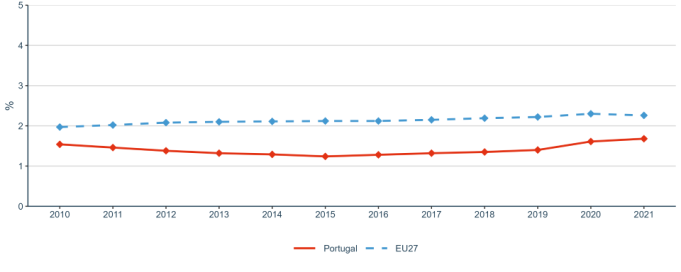



Priority 1: Deepening a truly functioning internal market for knowledge
Sub-priority 1.1: Open Science
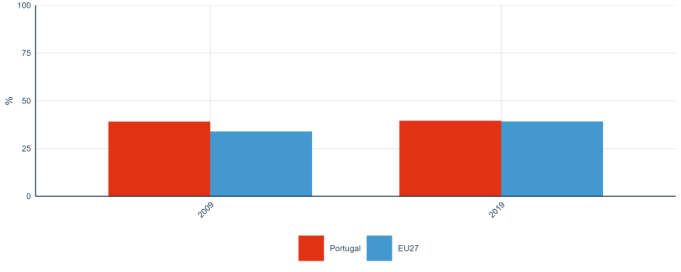
Sub-priority 1.2: Research infrastructures
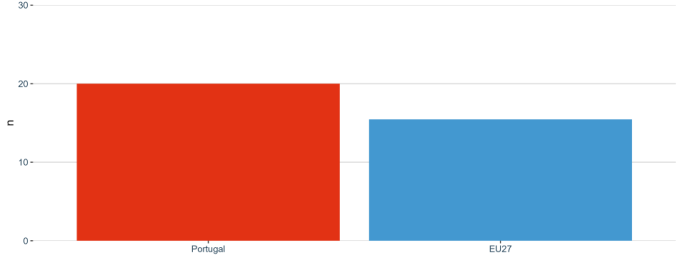
Sub-priority 1.3: Gender equality, equal opportunities for all and inclusiveness
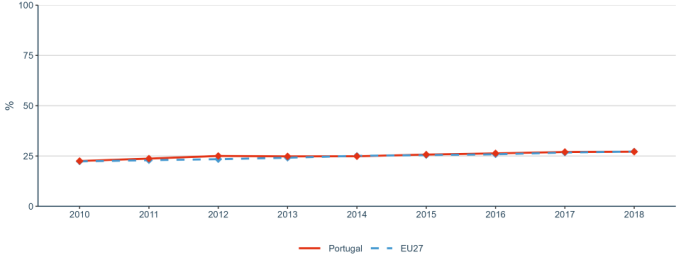



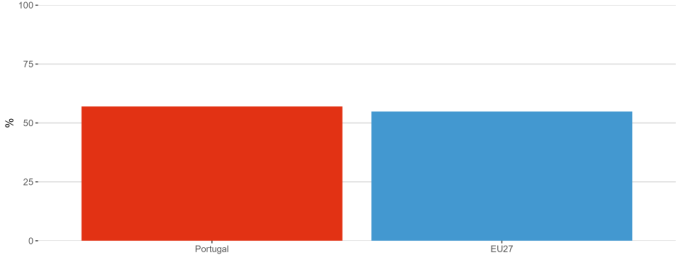
Sub-priority 1.4: Researchers’ careers and mobility and research assessment and reward systems

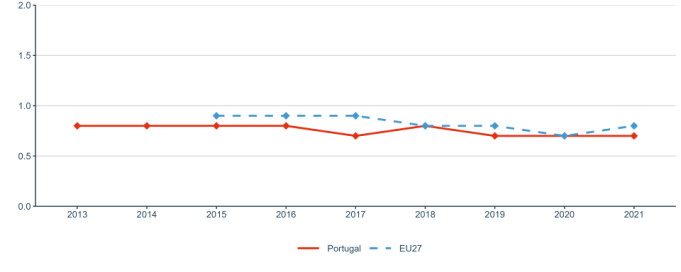
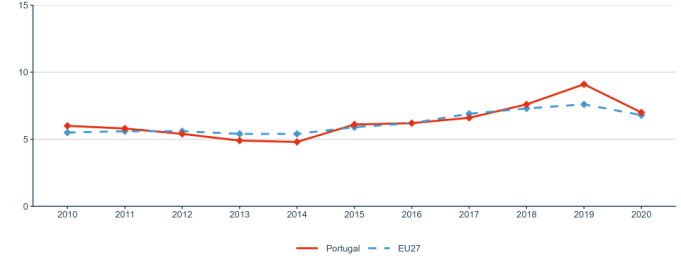
Sub-priority 1.5: Knowledge valorisation
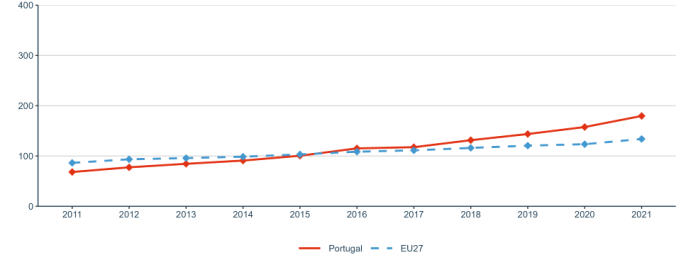
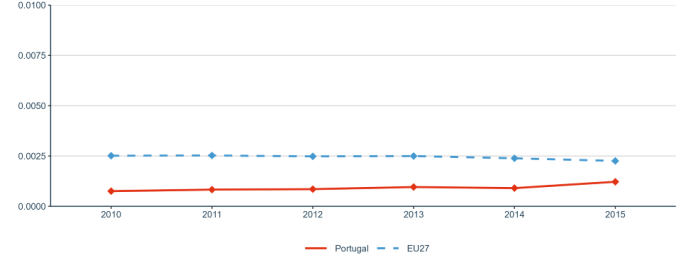
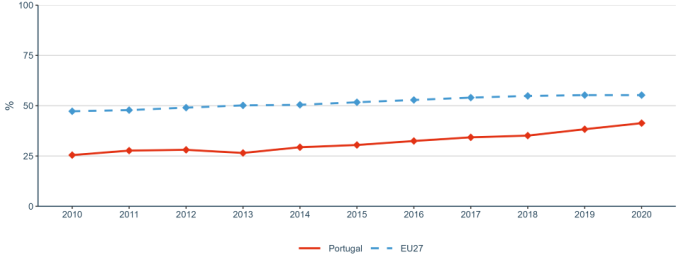
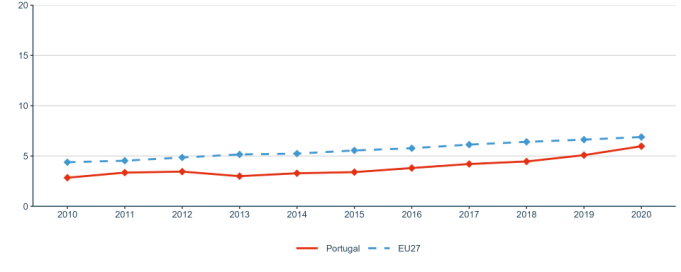
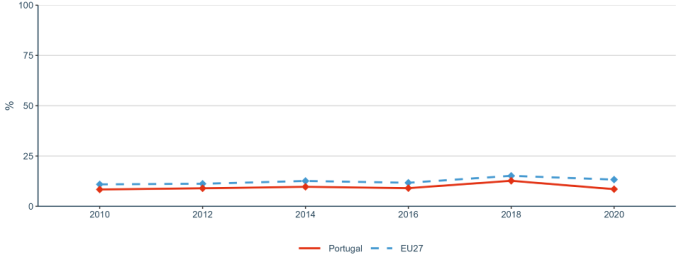
Sub-priority 1.6: Scientific leadership

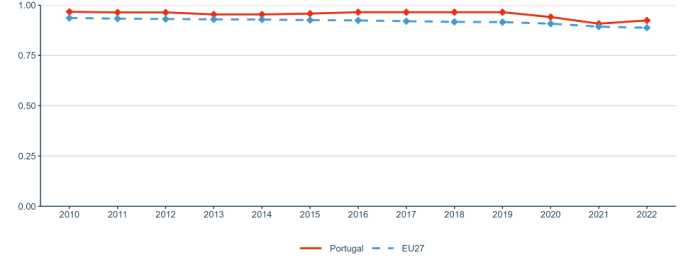
Sub-priority 1.7: Global engagement
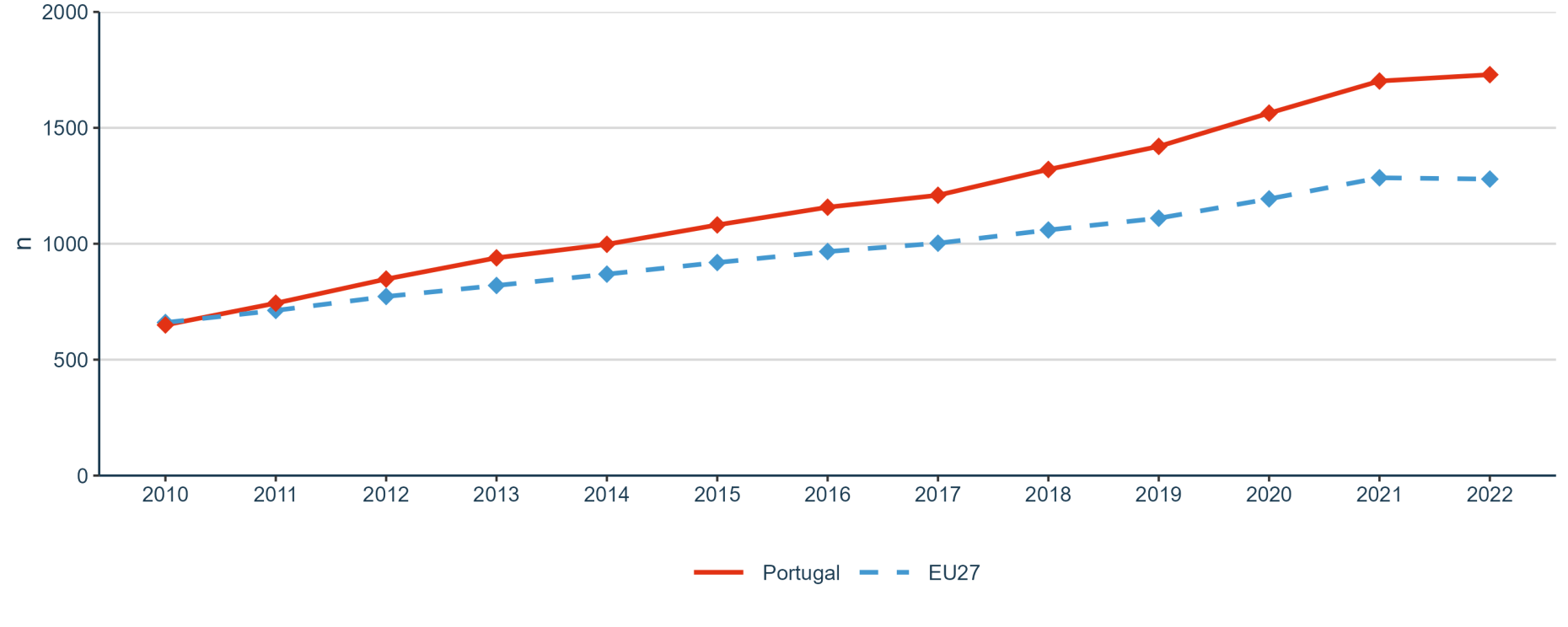

Priority 2: Taking up together the challenges posed by the twin green and digital transition and increasing society’s participation in the ERA
Sub-priority 2.1: Challenge-based ERA actions
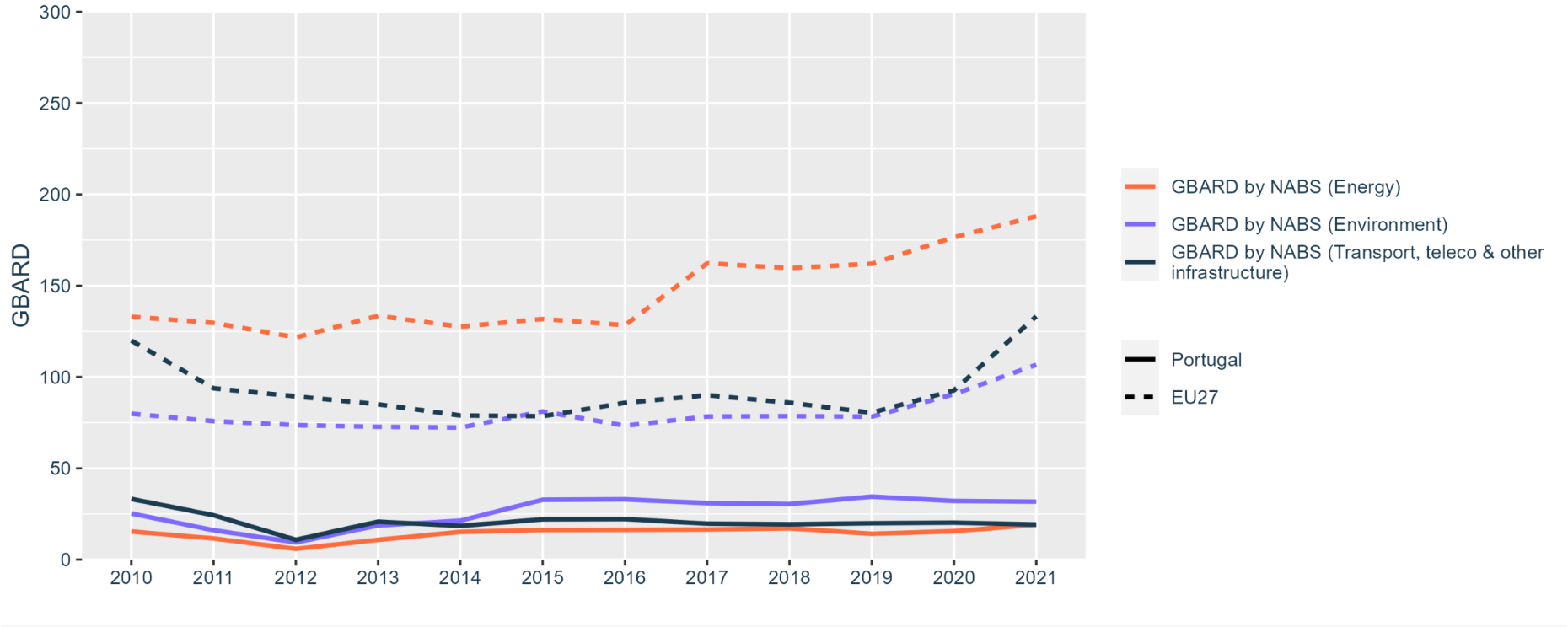
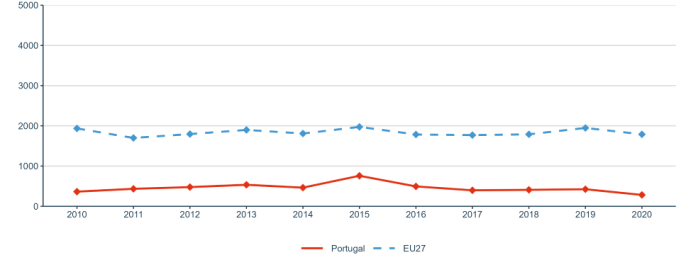


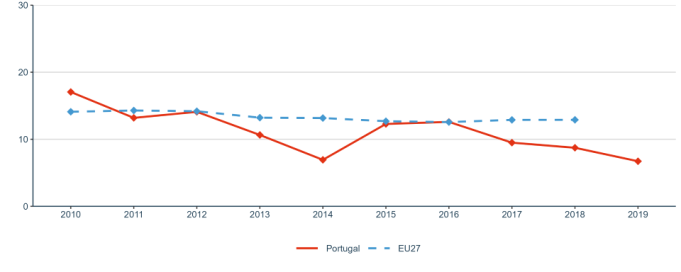
Sub-priority 2.2: Synergies with education and the European Skills Agenda

Sub-priority 2.3: Synergies with sectorial policies and industrial policy, in order to boost innovation ecosystems

Sub-priority 2.4: An active citizen and societal engagement in R&I in all its dimensions
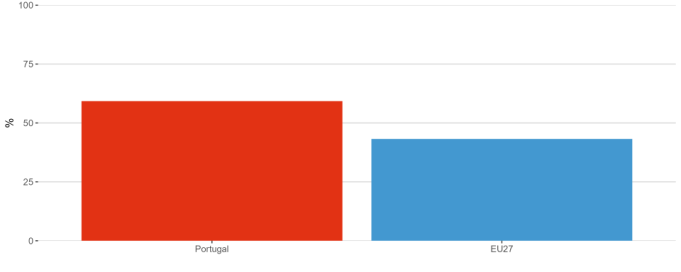
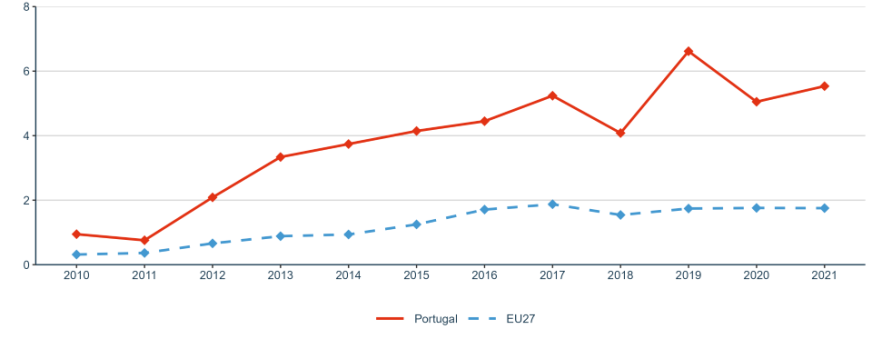
Priority 3: Amplifying access to research and innovation excellence across the Union
Sub-priority 3.1: More investments and reforms in countries and regions with lower R&I performance

Priority 4: Advancing concerted research and innovation investments and reforms
Sub-priority 4.1: Coordination of R&I investments
